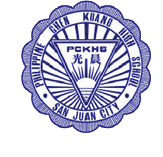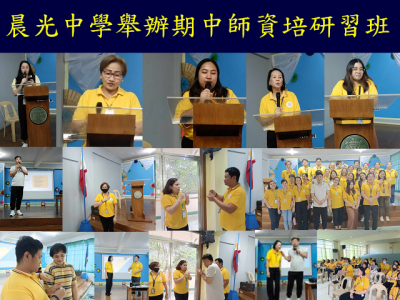Since the start of the school term in mid-July, one term has already passed. In preparation for the second term of learning, our school’s entire team of Chinese and English teachers gathered on November 6th (Monday) at 2 PM in the Li Hua Long Auditorium on the third floor for a mid-term professional development workshop. The workshop was led by Principal Huang Sihua and the Director of Human Resources, Kaila Keeshia Ricarte, with Ms. Therese Maza, an English teacher from the junior high department, serving as the emcee. First, Dr. Teresita Eusebio, the head of the senior high department, delivered a speech, expressing her delight at the school’s initiative to hold this professional development workshop on the occasion of the second term of the academic year. The purpose was to update academic knowledge and enhance teaching skills, hoping that the teachers could make the most of this opportunity to learn from the principal and the director of the human resources department. Following this, Principal Huang gave the first lecture.
During the lecture, Principal Huang mentioned that common concerns for today’s young people include financial pressure, overwork, and worries about self-image. At the same time, prolonged work hours, a lack of job security, stable housing markets, and rising living costs have also become factors they must contend with, which the previous generation did not have to worry about. Generation Z, born roughly between the mid-1990s and mid-2010s, exhibits some characteristics that have significant implications for the classroom. Some of these characteristics include:
- Digital Natives: Generation Z is often referred to as digital natives who grew up with technology and are accustomed to using smartphones, tablets, and computers from an early age, which may affect their learning preferences and styles.
- Multitasking Skills: Due to their exposure to various forms of media and technology, Generation Z is often skilled at multitasking. This might impact their ability to focus exclusively on one task or topic in the classroom.
- Visual Content Preference: Generation Z responds well to visual stimuli. They prefer learning through images, videos, and other visually engaging content. Incorporating multimedia elements into the curriculum can enhance their engagement and comprehension.
- Collaborative Learning: This generation values cooperation and teamwork. Group activities, collaborative projects, and discussions are often effective teaching methods because they align with Generation Z’s social and interactive nature.
- Personalization: Growing up in a customized era, Generation Z students prefer personalized learning experiences. Teachers who can adapt to individual learning styles may see better results.
- Short Attention Spans: A constant influx of information has led to shorter attention spans. Teachers may need to design concise, interactive, and diverse lessons to maintain student interest.
- Entrepreneurial Spirit: Generation Z tends to have an entrepreneurial spirit and seeks practical skills applicable in the real world. Including hands-on activities and practical applications in the curriculum may align better with their interests.
- Global Awareness: Thanks to the internet and social media, Generation Z has a global perspective and a sense of connectivity. Incorporating global perspectives into the curriculum makes the content more relevant and engaging.
- Desire for Feedback: Generation Z typically seeks immediate feedback. Teachers who provide timely and constructive feedback can meet this expectation and support their learning process.
Finally, Principal Huang emphasized that understanding and adapting to these traits can help educators create a more effective and engaging learning environment for Generation Z students.
Human Resources Director Kaila focused on professional etiquette in her presentation. She mentioned that professional etiquette involves presenting oneself in a refined and professional manner, demonstrating trustworthiness and a serious approach to work. In the workplace, how you present yourself to others is crucial. She emphasized several key points:
- Value Collaboration: Cherish collaboration with colleagues, parents, and other education professionals. Joint efforts can promote better teaching and learning environments.
- Dress Appropriately: Consider your attire, ensuring it meets professional standards and conveys a professional image.
- Punctuality: Be on time for meetings, classes, and other work-related gatherings to demonstrate your commitment to the job.
- Maintain a Positive Attitude: Maintain a positive and inspiring attitude, which not only enhances work efficiency but also influences students and colleagues positively.
- Recognize Strengths and Weaknesses: Honestly assess your strengths and weaknesses to better develop and improve.
- Pursue Professional Growth: Actively participate in professional development opportunities, such as seminars, workshops, and training courses, to continuously improve teaching skills and knowledge.
- Give Maximum Effort: Embed a wholehearted attitude in teaching and other professional responsibilities to demonstrate commitment to students and the job.
- Go Beyond the Call of Duty: Don’t settle for basic job duties; be willing to invest extra time and effort in participating in other school or educational institution activities and projects.
In conclusion, she mentioned that these behaviors and attitudes contribute to building a professional, positive, and cooperative teaching environment, while also earning the trust and respect of students, colleagues, and parents.
After the two lectures, an activity was held where teachers wrote down what they should and should not do in their teaching work and explained each point. The focus of the activity was to remind teachers of how to be effective educators. After a group photo for memory, the day’s workshop came to a successful conclusion.
本校自七月中旬開學以來,已過了一期時間,為了迎接第二期的學習,再度充實自己,本校全體中英文教師於十一月六日(星期一)下午二時聚集於三樓李華龍禮堂進行期中師資研習班,並由黃思華校長及人事部Kaila Keeshia Ricarte 主任擔任主講人,初中部英文教師Therese Maza老師擔任司儀。首先由高中部主任Teresita Eusebio博士致詞,表示很高興學校能在迎接學年第二期之際,舉辦了一場師資研習班,目的為更新學術知識及提高教學技能,希望老師們能把握機會,向校長及人事部主任學習。接下來,由黃校長作第一場講座。 黃校長在講座中提到對於今天的年輕人來說,最普遍的擔憂包括金錢壓力、過度工作以及對自身形象的擔憂。與此同時,長時間工作、缺乏職業安全感、房市平穩以及生活成本上升也成為了他們需面對的因素,這些是前一代人不必擔心的。Z世代,大致誕生在1990年代中期到2010年代中期之間,展現了一些對課堂產生重要影響的特質。其中一些特質包括:(一)數位原住民: Z世代通常被稱為數位原住民,他們在科技的陪伴下長大,習慣於從小使用智慧手機、平板電腦和電腦,這可能影響他們的學習偏好和風格。(二)多任務技能: 由於不斷接觸各種形式的媒體和科技,Z世代往往擅長多任務處理。在課堂上,這可能影響他們僅專注於一項任務或主題的能力。(三)偏好視覺內容: Z世代對視覺刺激有良好反應。他們更喜歡通過圖片、影片和其他視覺上引人入勝的內容學習。將多媒體元素納入課程可以提高他們的參與度和理解能力。(四)協作學習: 這一代重視合作和團隊合作。群體活動、協作項目和討論往往是有效的教學方法,因為這與Z世代傾向社交互動的性格相符。(五)自定和個人化: 由於成長在定制化的時代,Z世代的學生喜歡個性化的學習體驗。能夠適應個別學習風格的教師可能會看到更好的效果。(六)注意力短暫: 不斷湧入的信息流促使他們的注意力變得更短暫。教師可能需要設計簡潔、互動和多樣的課程,以保持學生的興趣。(七)企業家精神: Z世代傾向於具有企業家精神,並尋求可以應用於現實世界的實用技能。將實踐活動和實際應用納入課程可能會更貼近他們的興趣。(七)全球意識: 多虧互聯網和社交媒體,Z世代更具全球意識和聯繫感。在課程中融入全球觀點,使內容更具相關性和趣味性。(八)尋求反饋的渴望: Z世代通常尋求即時的反饋。提供及時且建設性的反饋的教師可以滿足這一期望,支持他們的學習過程。最後,黃校長強調了解並適應這些特質可以幫助教育工作者為Z世代的學生創建一個更有效且引人入勝的學習環境。 人事部Kaila主任針對老師的專業禮儀作主講議題, 她提到專業禮儀是指以精緻和專業的形象呈現自己,顯示出你值得信賴且能夠嚴肅對待事務。在職場中,你如何向他人呈現自己至關重要。她強調 學會重視合作: 珍惜與同事、家長和其他教育專業人士的協作。共同努力可以促進更好的教學和學習環境。(二)注意穿著: 考慮你的服裝,確保穿著符合職業標準,展現出專業形象。(三)守時: 准時出席會議、課程和其他工作聚會,以展現你對工作的認真態度。(四)保持積極的態度: 維持一種積極、鼓舞人心的態度,這不僅能提升工作效率,還能影響學生和同事。(五)認識自己的優點和缺點: 誠實地看待自己,了解自己的優勢和不足,以便更好地發展和改進。(六)追求專業進步: 積極參與專業發展機會,參與研討會、工作坊和培訓課程,以不斷提升教學技能和知識水平。(七)付出最大努力: 將全力以赴的態度融入教學和其他職業職責中,展現對學生和工作的承諾。(八)超越職責範圍: 不僅僅滿足於基本的職責,願意額外投入時間和努力,參與學校或教育機構的其他活動和項目。她作總結時,提到這些行為和態度有助於建立一個專業、積極和合作的教學環境,同時也能贏得學生、同事和家長的信任和尊重。 兩場講座完畢,進行一場活動,由老師寫出什麼是在教學工作上該做及不該做的,並請他們一一作出解釋,活動的重點是要老師提醒自己如何做一位稱職的老師。在大家合影留念後,一天的研習也圓滿結束了 ChatGPT 晨光中學的師資研習班似乎是一個非常有益且具有啟發性的活動,有助於老師們提升專業技能和專業禮儀。以下是這次研習活動的一些重要亮點: 校長和人事部主任的演講:校長的演講強調了理解和適應Z世代學生的特質,以改進教學方法。這種洞察力對於提供更有效的學習環境至關重要。人事部主任的演講則強調了專業禮儀的重要性,這有助於建立信任並維護良好的職場關係。 活動設計:活動讓老師們參與並自行討論在教學工作中應該做和不應該做的事情。這是一個很好的方式,讓老師們回顧自己的教學實踐並共享意見,以提高教學品質。 合照:合影留念是一個良好的方式,表達對研習活動的參與和支持,並加強師生之間的團結和合作關係。 總的來說,這次師資研習班不僅提供了有關Z世代學生和專業禮儀的重要信息,還促進了老師之間的互動和自我反省。這樣的活動有助於提升教育質量,為學生提供更好的學習體驗。ob.


